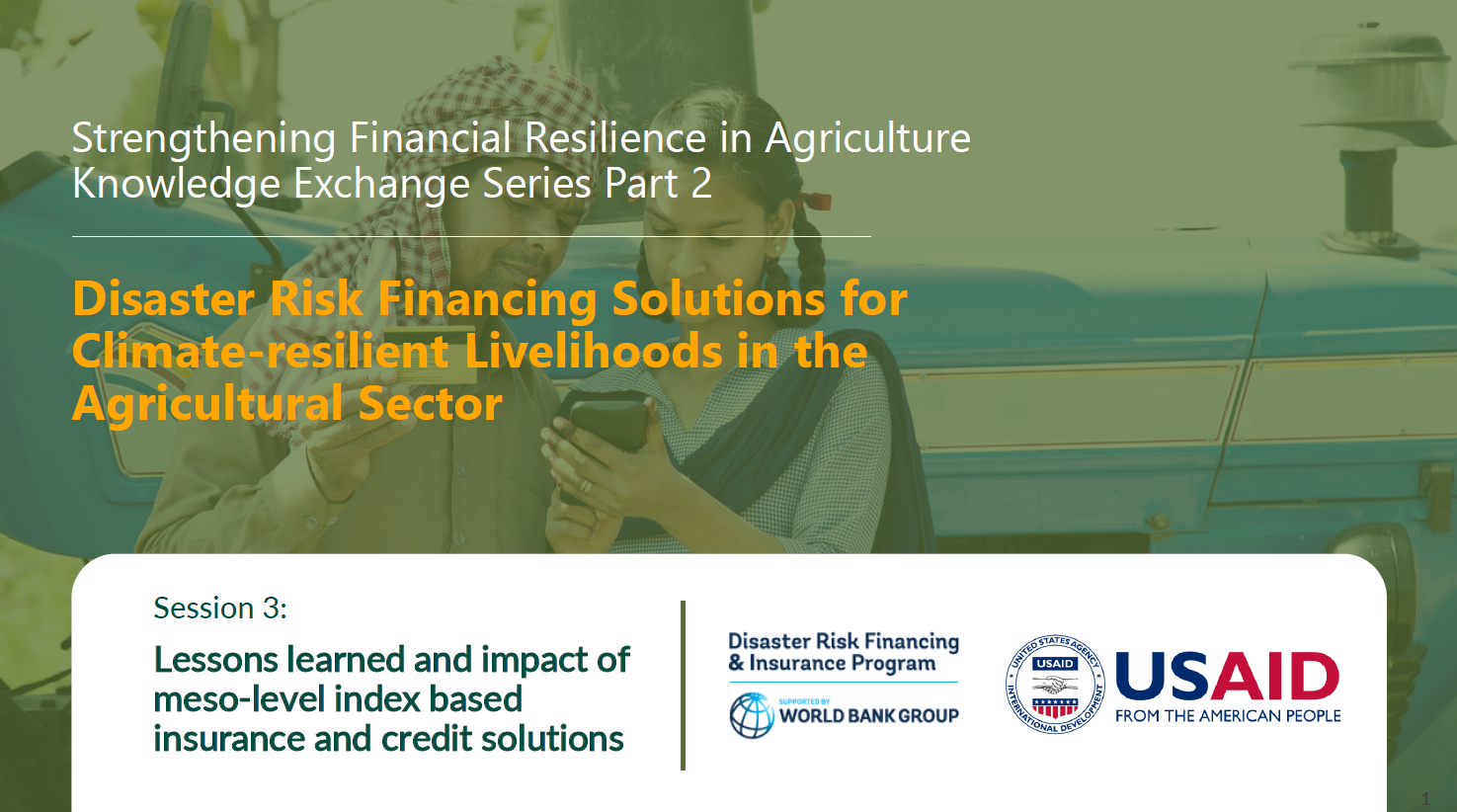[Event Recap] Webinar 3: Lessons Learned and Impact of Meso-Level Index-Based Insurance and Credit Solutions | Disaster Risk Financing Solutions for Climate-resilient Livelihoods in the Agricultural Sector

“Lessons Learned and Impact of Meso-Level Index-Based Insurance and Credit Solutions”, the third webinar in the “Disaster Risk Financing Solutions for Climate-resilient Livelihoods in the Agricultural Sector” knowledge series, was held on September 5, 2023. The webinar delved deep into meso-level solutions, which involve financial institutions (FIs) such as banks, cooperatives, microfinance institutions, or agricultural enterprises as policyholders. These entities utilize index-based solutions to protect themselves against widespread credit defaults caused by climate shocks and other disasters, and aim to ensure business continuity of the financial institution and its clients as well as improved risk management.
Qhelile Ndlovu (Financial Sector Specialist, Crisis and Disaster Risk Finance, World Bank Group), who facilitated the webinar, provided an introduction to the concept and the importance of meso-level index-based solutions. Compared to micro solutions, meso solutions target more financially savvy buyers, offering greater scalability and cost-effectiveness. These solutions can aid in business continuity and recovery lending, thereby fostering lending to the agricultural sector, albeit with some noted challenges, including a possibly indirect benefit to farmers and issues with basis risk.
Jerry Skees (Founder and Director, Global Parametrics) presented the rationale for using parametric solutions and explained the theory of change of meso-level solutions, underscoring the often-overlooked aspect of covering business disruption. While micro solutions normally address the immediate loss of assets in an emergency, the paramount role of meso solutions lies in securing business continuity for smallholder farmers and the firms serving them. Therefore, meso-level solutions aim to build resilience and ensure long-term business growth for FIs. Drawing on the example of VisionFund’s ARDIS, which covers 27 countries under a single contract, Jerry explained how the program’s layered meso-level arrangement uses a parametric (index-based) approach for risk retention (liquidity fund for less serious events and contingent credit for moderate events) and risk transfer. These strategies enable VisionFund’s micro financial institutions (MFIs) to protect their balance sheet in the aftermath of disasters and offer lending to small-scale farmers without increasing the cost of capital.
Reflecting on the practical experience of Global Parametrics, Wendy Smith (Impact and ESG Manager, Global Parametrics) offered key insights through two specific case studies in the Philippines and East Africa: 1) Collaboration with CLIMBS Life and General Insurance Cooperative in the Philippines to develop a parametric protection covering excessive rain and tropical cyclone wind speed events, distributed to agricultural lending cooperatives; 2) Collaboration with One Acre Fund, a social enterprise serving smallholder farmers in nine African countries, to offer annual meso-scale coverage against droughts and excessive rainfall, with benefits distributed based on the needs assessed on the ground.
Chuck Olson (Managing Partner, Enabling Qapital) discussed the development and implementation of Enabling Qapital’s innovative product, "Climate Resilient Enhanced Debt" (CRED). The product brings together credit, in the form of either senior or subordinated loans, with a risk transfer product-a climate hedge. These elements are structured into a layered debt system that provides liquidity and capital based on the severity of the climate-related event. Chuck emphasized the unique features of CRED: offering a solution tailored to the specific needs of FIs, financial layering of debt-only capital, providing commercial response that can be scaled without premium subsidies, and providing FIs with the option, not an obligation, to draw on the contingent credit line and/or receive a climate hedge. This solution enhances the business continuity of FIs by resolving uncertainty and maintaining operations with necessary liquidity and capital.
All the presenters reflected on lessons learned from the implementation of meso-level index-based insurance and credit solutions. They emphasized the importance of identifying strong partners, ensuring accurate and holistic risk assessment, addressing difficulties in tying up capital for infrequent events, recognizing the efficiency of safeguarding a firm’s balance sheet, acknowledging the business case for recovery lending, and understanding how a single debt structure can help overcome some of the basis risk inherent in insurance solutions. Operationalizing these solutions requires internal and external champions, appropriate initial underwriting, and regulation. Overall, there is a need for better data and methods to understand the risk. Given the complexity, technical assistance is also crucial to enable the design and delivery of these solutions.
The presentations were followed by an engaging question-and-answer session. The event saw 350 registrations and was attended by over 150 participants, including practitioners and policymakers.
Download the Webinar 3 presentations and fact sheet.
About the Knowledge Series:
The ‘Disaster Risk Financing Solutions for Climate-resilient Livelihoods in the Agricultural Sector Webinar Series’ aims to further deepen knowledge on agriculture insurance, and enable global knowledge exchange and collaboration among practitioners, technical counterparts, and policymakers of developing countries in designing and implementing disaster risk financing for agriculture. The series comprises four webinars delivered 4-6 weeks apart. Each webinar is accompanied by a detailed fact sheet summarizing the key learnings. (View resources from the previous webinars here). The webinar series offers a chance to achieve a World Bank-endorsed participation certificate. This knowledge series builds on the success of the first knowledge series, ‘Strengthening Financial Resilience in Agriculture’ that was delivered virtually in 2021-2022 (click here for more information).